26th Annual Summer Institute on Addictions
IDFPR and IL Certification Board Approved:
Counselors, Social Workers, CADC, Employee Assistance Counselors, Psychologists, Nurses
Main Page | Thursday Schedule | Saturday Schedule
FRIDAY, AUGUST 6TH
8:30am – 10:00am – Keynote
Nadia Al – Amin
Assistant Regional Administrator
Substance Abuse and Mental Health Services Administration
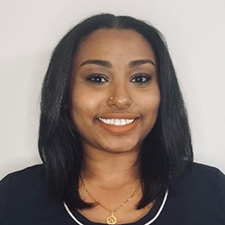
About Nadia Al – Amin: Before joining SAMHSA as an Assistant Regional Administrator, Nadia worked as a Behavioral Health contractor at the SAMHSA region 5 office where she was responsible for planning and coordinating interagency projects for preventing opioid overdoses, reducing stigma around mental health and addiction, and addressing mental health and substance misuse in minority communities. Nadia has extensive experience fostering relationships among state and federal health officials as well as philanthropic agency leaders. In 2018, Nadia completed a two-year Council of State and Territorial Epidemiologists (CSTE) fellowship where she was assigned to the SAMHSA and Office of the Assistant Secretary of Health (OASH) region 5 offices. During her time in her fellowship, Nadia assisted the Michigan Department of Public Health with their response to a Hepatitis A outbreak in southeast Michigan and their follow-up response to the Flint water crisis. She also coordinated efforts to bring together region 5 state health officials, single state authorities, and philanthropic partners to discuss opportunities for collaboration around opioid overdose reduction. Nadia also has experience working as a behavioral health intern in the SAMHSA Office of Behavioral Health Equity (OBHE) working to address disparities in suicide rates. Nadia plans to continue to address behavioral health disparities in minority communities through her work at SAMHSA.
FULL-DAY WORKSHOP
10:30am – 4:30pm (6 CEUs)
Workshop C and D:
Healing from Racism Part 1 and 2
Presented by Lisa Lackey, LCPC, CSAT, CMAT, EMDR II

About Lisa Lackey: Lisa has worked in the field of addiction and trauma since 1994. Lisa and her husband co-founded Insideout Living, Inc. in 1999. Lisa and her spouse envisioned a clinical practice that would help people make sense of parts of their lives that were confusing, overwhelming, and painful. She believes that trauma healing comes from completing an emotional experience that may have only been completed as a physical experience long ago. Through compassion, cutting-edge treatment modalities, and a great team, Lisa believes that life can change. She helps people understand their own history and how it currently informs the present. Lisa understands individuals inadvertently “trap” parts of their life experience and helps clients understand why these patterns were formed.
Lisa supports clients to begin to form new patterns and believes they can begin to make small shifts that will lead to bigger changes. This process gives access to pain and trauma that are “stuck”, where the feelings can be released. She is driven by the passion to support individuals as they journey toward resolution from the inside out. Her clinical expertise is in the treatment of trauma and substance use disorders.
Lisa has two master’s degrees, one in education from Garrett-Evangelical Theological Seminary at Northwestern University and the other in counseling from National Louis University. She has worked as a pastor; acts as a leadership development consultant and is a public speaker in a variety of venues. She loves learning and teaching. Lisa is also a Certified Multiple Addictions Therapist (CMAT). She has had training in Somatic Transformation, and she is a Level II EMDR therapist. Lisa’s passion for the work she does makes her a dynamic and compassionate therapist, as well as an engaging speaker who connects easily with individuals and large audiences.
Description:
As mental health professionals, we understand the chief complaint of the client seeking mental health care is merely the tip of the iceberg. The chief complaint is thought of as the problem that a client wants “fixed.” It becomes the professional’s responsibility to address the complaint and provide interventions to support stabilization. Tip of the iceberg treatment misses the causes and conditions that inform the visible flawed solution.
Addressing structural racism in the mental health systems requires us not to mistake the symptom, racism for the problem. Lasting change takes time, consistency, honesty, openness, and willingness to begin recovery from the mental illness of racism, which is a clear and present danger to health and wellbeing.
Learning Objectives:
• Explore the causes and conditions underlying racism.
● Gain a historical perspective of structural racism and the mental health system.
● Identify causes and conditions contributing to mental health care stigma within BIPOC communities.
● Understand the impact of resentment, fear, shame, and silence that perpetuate the traumatic cycle of racism.
● Learn about the triggers of the present and their connection to the traumatic impact of racism.
● Explore and acknowledge ways in which racism has been integrated into our minds and actions.
● Discover ways to support yourself and others.
INDIVIDUAL WOKSHOPS
10:30am – 1:30pm (3 CEUs)
Workshop E
Topic: How Does One Become Empowered by being Powerless: The Spirituality of the 12 Steps of Alcoholics Anonymous
Presented by Ms. Sylvia Corcoran, LCSW, MC.Ed.
Loyola Field Placement for MA Social Workers
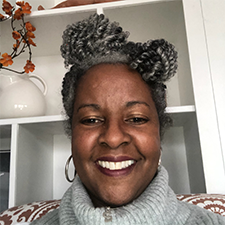
About Sylvia Corcoran: Ms. Sylvia Corcoran is an Internship Coordinator at Loyola University School of Social Work. She joined the Loyola staff in 2014 and has taught foundational and 600 level seminar courses as an Adjunct Instructor. Sylvia earned a masters in Christian Education from Garrett Evangelical Theological Seminary in Evanston Illinois. She went on to obtain her second masters earning an MSW from Loyola University School of Social Work. Her academic achievement led to her becoming inducted into Alpha Sigma Nu, a Jesuit honor society that recognizes academic scholarship. Prior to coming to Loyola, Ms. Corcoran was an Adjunct Instructor and Field Liaison with the social work department at Northeastern Illinois University. Ms. Corcoran was a member of the group practice at the Family Institute at Northwestern University prior to becoming an Affiliate Therapist for nearly ten years. Ms. Corcoran maintained a private practice for several years where she provided clinical services to individuals, couples, and families. She treated clients dealing with depression, anxiety, spirituality, work-life balance, and a host of other challenges. Ms. Corcoran has been an active committee member of the Naomi Ruth Cohen Institute (NRCI) that sponsors an annual mental health conference. Ms. Corcoran has been a guest as well as guest-host of Focus on the Family, a local cable program broadcast on CAN-TV. Ms. Corcoran recently joined the practice of Inclusive Insight Psychotherapy & Consulting as an independent contractor. Ms. Corcoran strives to support others to live their best lives.
Workshop F
Topic: It’s the Relationship that Heals: Lessons for Counselors on Resilience for Women and Racially Minoritized Individuals.
Presented by Dr. Eric Brown, Ph.D., LPC
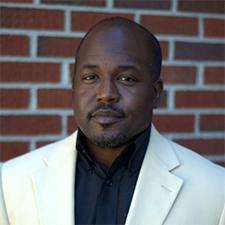
About Eric Brown: Eric Brown received his Ph.D. in Counselor Education and Supervision from Old Dominion University in Norfolk, Virginia. His research interests include trauma, interracial supervisory and counseling relationships, interracial mentoring, burnout prevention of helping professionals, and the resilience of minorities. He is an active member of the American Counseling Association and the Association for Counselor Educators and Supervisors. He pursued his Ph.D. in Counselor Education because of his passion for working with beginning clinicians to help them address the needs of persons from traumatic backgrounds. Dr. Brown works in private practice one day a week at Alliance Clinical Associates. He is an Assistant Professor at DePaul University in the Counseling program where he teaches classes on trauma counseling, addiction counseling, and group therapy.
Description:
Research has shown that relational health is a predictor of mental and emotional health. Moreover, scholars have begun to focus more on the resilience of oppressed people groups to understand ways that all people can grow and develop in healthy ways. In this presentation, we will look at specific relational factors that contribute to the healing of trauma and addiction. Relational Cultural Theory will be discussed as well as research that shows how persons with marginalized identities foster resilience.
Learning Objectives:
• Participants will understand three major components of Relational Cultural Theory.
• Participants will identify three attributes of growth fostering relationships.
• Participants will learn at least two assessments that may be used to identify relational health.
1:30pm – 2:00pm – LUNCH BREAK
2:00pm – 5:00pm (3 CEUs)
Workshop G
Topic: The Power of Being Enough: Connection, Identity, and Attachment in Recovery
Presented by Justin Wolfe, LCPC, CADC, CRC
Linden Oaks
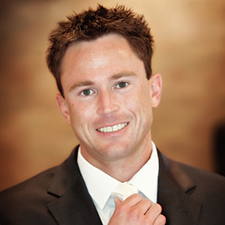
About Justin Wolfe: Justin Wolfe is a Licensed Clinical Professional Counselor, Certified Alcohol and Drug Counselor, and Certified Rehabilitation Counselor. Justin is a graduate of Adler University in Chicago, IL where he obtained his master’s in counseling with a specialization in rehabilitation. Justin is the manager of the Dual Diagnosis and Addiction Services Outpatient Program at Linden Oaks Hospital. Justin has been with Linden Oaks Hospital for nine years where he has been active in developing the treatment curriculum for the Adult and Adolescent Dual Diagnosis and Addiction Services Programming. Justin has experience working in residential treatment settings with adolescents on probation with co-occurring disorders, Adult Residential Addiction Treatment, and currently also works in private practice seeing adults, adolescents, and families. Justin has been active in the community providing education and training in schools, conferences, local organizations, and had the opportunity to present at the ASAM National Conference on Utilizing Contingency Management within Addiction Treatment. Justin is also a former High School Boys Varsity soccer coach.
Workshop H:
Topic: Approaching Clinical Work with Clients in the LGBTQIA+ Community
Presented by Dale Roberson, LCSW, CADC
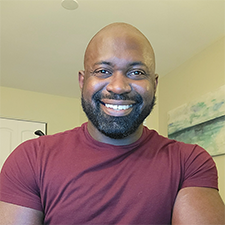
About Dale Roberson: Dale Roberson, LCSW, CADC, a University of Chicago graduate, has been a substance use therapist for the Recovering with Pride (RWP) program at Howard Brown Health Counseling Center since October 2020. His most recent professional experience includes the Manager of Outpatient Services at Haymarket Center for two years prior. Dale’s trauma-responsive clinical applications including, but not limited to, dialectical behavioral therapy (DBT), substance use management/harm reduction, and motivational interviewing. In addition to his work at Howard Brown Health Counseling Center, Dale is a facilitator for Haymarket Center’s six-month CADC/Addiction Counselor preparatory course; in recent years, teaching and providing in-service multicultural diversity and awareness competency training have contributed to his expanding skill sets.
Description:
It is important to recognize that some equality for the LGBTQIA+ community continues to shift in a more positive direction. However, shame, stigma, bullying, homophobia, biphobia, and transphobia, still create barriers for many LGBTQIA+ people to access and receive affirming care. The presentation is designed to develop provider skills in delivering culturally responsive prevention and treatment services for these populations. Content focus areas include various levels of privilege/oppression that exist within the community, physical health, substance abuse treatment, mental health, and other health-related concerns for LGBTQIA+ populations. In addition, this presentation discusses the impact of trauma (along with statistical data), risk/protective factors, and methods to increase affirmative practice and “ally-ship.”
Objectives:
• Unpack pronouns and the key differences between gender identity, gender expression, sex-assigned-at-birth, and various other key terms and concepts.
• Discuss different phobias and -isms, privilege, the Riddle Homophobia Scale, and biphobia in society.
• Disclose related health issues as they relate to lesbians, gay men, bisexual, and transgender individuals.
• Utilize statistics to understand trauma, the lasting effects of trauma, intimate partner violence, violence against transgender women of color, and risk/protective factors.
• Evaluate ways to engage in more affirmative practice in working with sexual and gender minorities, issues with the “coming out” process, and ways to increase “ally-ship.”
CLICK HERE TO REGISTER FOR THE 2021 SUMMER INSTITUTE ON ADDICTIONS
| Workshop Registration & Pricing | Single Workshop | 1 Day | 2 Days | 3 Days |
| General Admission | $80 | $135 | $255 | $360 |
| Senior Rate (62+ years of age) | $70 | $80 | $175 | $250 |
| Student Rate | $70 | $80 | $175 | $250 |
For questions or concerns, contact:
Lisa Abrams, LCPC, CSADC
Director of Staff Training & Development
Labrams@hcenter.org
312-226-7984 ext. 581